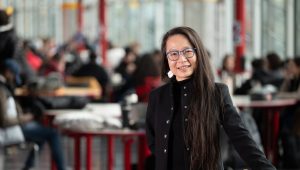In a small room in Hull, at an undisclosed location, a group of Ottawa-area researchers have built a super computer.
It’s got hundreds of times the processing power of your average desktop, and will soon integrate high-end graphic processing units, similar to ones gamers use, but the techies’ aim has nothing to do with virtual fantasy gameplay.
They hope to help cure cancer.
(Sponsored)

A commitment to mentoring and development creates the next generation of firm leaders
HW Partners (Formerly Hendry Warren LLP) is excited to announce the appointment of Celine Fu, CPA, CA, and Robin Lawrence, CPA, CA, to the firm’s partnership. The Partners are proud

New dean of uOttawa’s Faculty of Engineering brings a history of entrepreneurship and innovation
Caroline Cao has been impressed by many aspects of uOttawa’s Faculty of Engineering since being appointed dean in August. But it was after the faculty’s recent Design Day – a
The way they plan to do that is based on a new word: bioinformatics.
Bioinformatics is the effort to store, analyze and understand the data acquired by studying the molecular structure and DNA of diseases. The amount of information being gathered is immense, and there is more and more of it on its way, according to groups like Compute Canada who build and make available supercomputers to all kinds of science researchers.
Cancer Computer, the name of the not-for-profit in the Ottawa area founded by Roy Chartier, is working on doing the same thing, but specifically for cancer research.
Asked why cancer specifically, he said, “I think that cancer is the greatest challenge to face our civilization.”
Chartier was first set on the idea after watching a six-hour PBS documentary, which left him wondering what he could do to help. He soon found his background in programming and technology engineering is highly needed.
Research is moving more and more into computer simulations, he said. “There is an explosion of data, and so far, no one is meeting that need.” Luckily, he has just the skills to help.
Now Chartier, about 17 volunteers and a group of board members are making their super computer available to universities in the U.S. and cancer researchers anywhere, either for free or at highly discounted prices.
The group hopes to expand to another facility sometime next year, and start working specifically with Ottawa-area cancer researchers.
This article originally appeared in Metro News.


